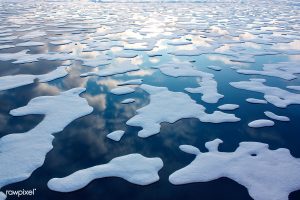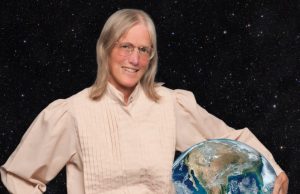Antarctic sea ice crashed further and faster than the Arctic! Senior NASA expert Claire Parkinson reports. More “Retreat from the Coast” as Patrick Marchman tell us about professionals planning the great migration away from the sea.
*** WATCH THIS TYPOON IN THE PACIFIC*** Typhoon Hagibis set to hit Japan…it went from a tropical depression to a Cat 5 Cyclone in less than 18 hours, close to a record. The hotter ocean can force stronger hurricanes in a warming world (watch this one in the Pacific). An article here in the Japan Times and really excellent coverage here in the Washington Post, including all the climate drivers.
WHAT TO EXPECT IN THIS PROGRAM
Some time places we don’t see or care about can change rapidly, and that ripples around the world. Antarctica is one of those places. Events there will re-draw the maps of coastlines, drown cities, and change weather in the Southern Hemisphere.
Listen to or download this Radio Ecoshock show in CD Quality (57 MB) or Lo-Fi (14 MB)

Our tiny local paper mentioned Antarctic this week. The paper is one of a chain of advertising platforms owned by a media baron who hires climate deniers and social haters as Op Ed columnists. Our chain Grinch told readers one proof there is no warming – or if there is we didn’t do it – sea ice is expanding around Antarctica. Those egg-heads in lefty University science departments didn’t predict THAT when the world is supposed to be getting hotter…
Except he’s wrong. Untold by his paper and most others, the sea ice around Antarctica has crashed further and faster than the famous disappearing sea ice in the Arctic. We are going to explore that story with one of the most senior climate scientists and satellite specialists at NASA’s Goddard Space Flight Center. Claire Parkman has tracked polar ice sheets from space for decades.
Then we go to Part Two of my series “Retreat from the Coast”. Sooner or later, rising seas combined with higher storm surges will force a mass migration from coastlines all over the world. Two weeks ago, in my show broadcast September 25, we heard Dr. A.R. Siders on research which I could characterize as “Do we plan or do we panic?”.
This week, we discover there is a whole group of professionals in America already organizing to plan out ways to cope with the ocean moving into the land during this century and many centuries to come. We talk with one of them: environmental planner Patrick Marchman.
======================================================================================================================
THE TRUTH ABOUT ANTARCTIC SEA ICE – NASA’S CLAIRE PARKINSON
Since 1978, Dr. Claire Parkinson has been a climatologist at the NASA Goddard Space Flight Center. She is currently their Senior Scientist for climate change. She is also Project Scientist for Aqua, the multi-tooled satellite launched in May 2002. We are calling Claire now about the sudden collapse of sea ice – not in the Arctic – but around Antarctica. Claire has been publishing about Arctic and Antarctic sea ice extent for several years.

Claire Parkinson, NASA
Listen to or download my 29 minute Radio Ecoshock interview with Claire Parkinson in CD Quality or Lo-Fi
When Arctic Sea ice crashed in 2007, at the other pole sea ice was spreading further away from Antarctica. That was different from what models predicted under global warming. Why did the Antarctic sea ice expand until a peak in 2014. And then why did it crash precipitously in the following three years?
Scientists have been struggling to answer that mystery. The Polar Vortex winds have tightened toward the South Pole (which can reduce rainfall in parts of Australia). Perhaps the effect of the continuing ozone hole is a factor. Others have looks at cycles in the Indian Ocean and “teleconnection” from other events. It has been my observation that when scientists offer competing explanations for an event, we probably do not know yet. That is what Parkinson tells us.
In July Parkinson published the paper “A 40-y[ear] record reveals gradual Antarctic sea ice increases followed by decreases at rates far exceeding the rates seen in the Arctic” in PNAS. In the Discussion section we find, quote: “This illustrates that the ice decreases since 2014 are no assurance that the 1979–2014 overall positive trend in Southern Ocean ice extents has reversed to a long-term negative trend.”
So we can not yet be sure there is a relationship between the observed warming of the world and the recent big reduction in sea ice around Antarctica. It is a mixed bag of results. The decrease in three years was greater than any seen before in the 40 years of reliable measurements. But the Antarctic ice has a history of being variable. We could be seeing a vivid demonstration of the impact of global warming on Antarctic sea ice – or the sea ice could bounce back. We don’t know.
But it is important to remind ourselves these records of Antarctic sea ice do not include ice loss from glaciers on land. Antarctic glaciers are releasing vast amounts of water into the global ocean, and sea levels will rise around the world because of that. Loss of sea ice does not directly contribute to rising seas. However less ice equals more open ocean with surface that absorbs rather than reflects the sun’s energy. That warms oceans which speeds Antarctic glacier loss.
At some point in global warming, could the Antarctic sea ice history of variability be overcome by more heat and warmer seas? Could the Antarctic sea ice become a dependable signal of the amount of warming, as it is in the Arctic?
In PNAS, the paper authors sum up:
“A newly completed 40-y[ear] record of satellite observations is used to quantify changes in Antarctic sea ice coverage since the late 1970s. Sea ice spreads over vast areas and has major impacts on the rest of the climate system, reflecting solar radiation and restricting ocean/atmosphere exchanges. The satellite record reveals that a gradual, decades-long overall increase in Antarctic sea ice extents reversed in 2014, with subsequent rates of decrease in 2014–2017 far exceeding the more widely publicized decay rates experienced in the Arctic. The rapid decreases reduced the Antarctic sea ice extents to their lowest values in the 40-y record, both on a yearly average basis (record low in 2017) and on a monthly basis (record low in February 2017).”
We also discuss geoengineering to keep the Poles cooler and the Sudden Stratospheric Warming event that just happened over Antarctica.
You can watch a presentation by Claire Parkinson on You tube here: “Satellite Contributions to Climate Change Studies”, published on Jan 22, 2019. There is also a You tube about the new paper on Antarctic sea ice.
======================================================================================================================
PLANNING RETREAT FROM THE SEA – PATRICK MARCHMAN
As Hurricane Dorian showed us again, storm surge rises ever higher when more powerful hurricanes start from a base of rising seas. Doesn’t anyone see that many islands and coasts around the world will have to be abandoned? Is America ready to leave Miami and so many other coastal towns and ports? Should we plan for that or just wait for collapse and panic? Where will everybody go?
Our next guest is on the ground floor of that planning in America. When Patrick Marchman first contacted me around 7 years ago he was frustrated working for FEMA, the Federal Emergency Management Agency – and that was before Trump appointed incompetent leaders and slashed the FEMA budget.
Now Patrick is a member of the Agenda Setters for the Climigration Network. He founded the Climate Migration and Managed Retreat Member Interest Group, at the American Society of Adaptation Professionals. Marchman has a Master’s degree in Marine Affairs from the University of Washington in Seattle. He is a Certified Environmental Planner.

Patrick Marchman
Listen to or download my 27 minute Radio Ecoshock interview with Patrick Marchman in CD Quality or Lo-Fi
It seems fair to say everyone from state Governors to Chambers of Commerce to real estate developers – they all hope Patrick and I just shut up and go away with this “leave the coast” talk. There are a lot of vested interests in stalling the inevitable need to move millions of people away from the dangerous sea coast, with it’s pounding storm surges, floods, and coastal erosion. Does the banking system depend on those coastal properties keeping their high value and mortgage payments?
Let’s take the case of Florida. We have seen maps showing that eventually, perhaps in a century or three, almost half of Florida will go under the rising seas. The exodus of Floridians may happen in several steps, likely initiating after each major climate-driven weather disaster – just as a lot of people left New Orleans after Hurricane Katrina, or Puerto Rico after Hurricane Maria.
Some of the folks who fled New Orleans after Hurricane Katrina went to Houston. Within two years, some of the same people got flooded out of Houston, and went to places like Tennessee or Colorado. Over this generation there could be multiple migrations.
As far as I can find out, and Patrick says the same. The U.S. government does not have a secret master plan to withdraw from coastal areas that will be flooded by rising seas and super storm surges. But there are people talking about it and working on what we need: the American Society of Adaptation Professionals, and the Climate Migration and Managed Retreat Member Interest Group.
Some South Pacific Islanders, who can already see their homes flooding regularly, have already arranged safe exits to places in Australia and New Zealand. National governments have agreed on this plan. Why aren’t there similar plans within the United States which has thousands of miles of coastlines that will march inland?
I think the average person always thinks they will return home no matter what. The talk after a big disaster, whether it is a flood, storm, or fire – is always about “we will rebuild”. But they want to rebuild the same maladapted structures and infrastructure, right back in the same danger zone. How can we get out of that suicidal loop?
In the U.S. Northeast, Governments spent tens of billions of dollars to recover after Hurricane Sandy. As climate change gets worse, the oceans heat, super-storms build over the high seas – is it possible the economic losses from the coasts alone could collapse the economy?
It sounds like part of the problem is psychological. People are deeply, deeply attached to places, communities and even local geography. It would take a whirl-wind to pry most of us loose. We cannot hope to avoid panic without addressing that psychology.
Humans do adapt, and sometimes that adaptation can stall real solutions. For example, heat deaths in countries from the United States to India have gone down with government planning around cooling centers, better notification, closing schools or industry. But that means it will get hotter and hotter and we may take it less seriously because fewer people die. The same can be said for any disaster management. What if we perfect our temporary evacuation so that hardly anyone dies, but miss the point: we just can’t afford to keep coming back to a place when it goes underwater over half the year.
Patrick and his group want to find artists, activists and authors to help plant these ideas and push the planning process. Contact Patrick if you have ideas or suggestions.
We all hope there are rational solutions. I am less optimistic. I think we will retreat and not rebuild. And it’s not like we have a big margin of carbon we can spend on hopelessly trying to hang on to places. The carbon costs of repeated efforts to rebuild could push us past the brink of survivable climate futures. We just have to get out of that loop! Marchman says that although his home in Kansas City Missouri is safely inland, projections of heat and humidity there could make things unbearable. So he too will likely become a kind of climate refugee in the future.
Find out more at www.climigration.org
MY THOUGHTS ON RETREATING FROM THE COAST
In my recent show I talk with John Englander about rising seas. He has founded an International Institute to study rising seas (at least it Is trying to get off the ground).
In our interview, and in his talks to at least 10,000 people, Englander tries to make lemonade out of lemons by suggesting the retreat from the current ports, cities, etc. could be a tremendous boost to a new economy, requiring the new buildings of many world airports for example that are right at sea level now.
But as I say in that conversation, I am far less optimistic, thinking we will retreat and likely not rebuild. I failed to add that just the carbon costs of such rebuilding could push us past the brink of survivable climate futures.
Here is the blog, with links to the audio…
The other group which is tangentially involved is the local food movement, and various transition town and sustainability ventures. If we have to fall back from the coasts, and the global economic exchange suffers, then providing food locally would become key.
Of course there are voices in the insurance, and re-insurance industry, which are speaking out about the damages and recourse during a period of rising seas, more intense rainfall, fires and other risks. It is possible the Dutch and the Swiss have plans. After Hurricane Sandy we had J. Court Stevenson on the show explaining options for sea containment to prolong the life of big cities like New York, London, or Rotterdam. I am working to arrange an interview about the fate of fabulous Venice.
I’m sorry I cannot provide ideas for other experts at this time, which shows how little this dialog has progressed, and how far to go.
=======================================================================================================================
COMING UP NEXT WEEK: ROB HOPKINS AND PATRICK BROWN
Patrick Marchman mentioned Rob Hopkins’ new book coming out in the middle of October. Rob co-founded of the Transition Towns Movement. He is an inspiration for many localization efforts around the world. Rob will be our guest next week on Radio Ecoshock.
Next week we will guess at our climate future with expert scientific help. Patrick Brown from San Jose may have some surprises for us. I want to ask him about a paper suggesting a braking mechanism on our apparent civilizational suicide. It is awful to think, but maybe climate damage will be so severe it will slow the economy. As Professor Tim Garrett told us on this show,
with fossil fuels, the economy is a heat engine.
When the economy roars, so do greenhouse gas emissions. That is happening right now. We just had a big increase in greenhouse gas pollution over the last year and a half.
If things fall apart could that save us from a worse fate? Stay tuned to Radio Ecoshock for more in a perverse universe. I’m Alex Smith. Thank you for your support and caring about our world.